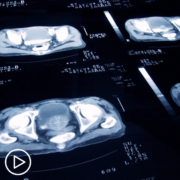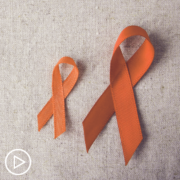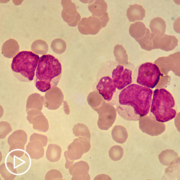What Can Signal Hormone-Sensitive Advanced Prostate Cancer?
What Can Signal Hormone-Sensitive Advanced Prostate Cancer? from Patient Empowerment Network on Vimeo.
Advanced prostate cancer patients may experience common symptoms, but what are they? Expert Dr. Yaw Nyame with the University of Washington explains the range of symptoms that metastatic patients may experience and common treatments for advanced prostate cancer.
See More from [ACT]IVATED Prostate Cancer
Related Resources:
Transcript:
Lisa Hatfield:
What is advanced hormone-sensitive prostate cancer, and are there specific symptoms or warning signs to be aware of?
Dr. Yaw Nyame:
When we have prostate cancer that has spread beyond the prostate. We define that as advanced or sometimes we call it metastatic prostate cancer. And early on in that process, we can control and often kill many of those prostate cancer cells by taking away testosterone. Testosterone ends up being like the fuel that allows these cancers to grow. And so when we say a prostate cancer is hormone-sensitive, what we mean is it’s sensitive to testosterone, and by shutting off testosterone, we can effectively manage and or kill those prostate cancer cells.
Over time, when we shut off that testosterone, prostate cancers will learn how to produce internally their own testosterone or develop resistance or find ways to still survive in the absence of testosterone, and when that happens, we call that pheromone-resistant or sometimes you will hear the term castrate-resistant prostate cancer.
Advanced prostate cancers are going to be in a category of cancers where people may have symptoms, those symptoms aren’t always specific, they can range from difficulty urinating, having blood in the urine, having fractures of bones that have been invaded with cancer, weight loss, loss of appetite, and so that is sort of a broad spectrum of symptoms that someone could potentially experience with an advanced prostate cancer, but not all folks are going to have those particular symptoms, because oftentimes when you have severe prostate cancer-related symptoms, those are in pretty advanced stages, meaning you have a pretty high amount of cancer that is outside of the prostate.
My activation tip, when it comes to hormone-sensitive prostate cancer that is advanced, is to be informed about the latest therapies that we offer in this space, because it is constantly changing 15 years ago. The mainstay of treatment was just hormone blockade, and we put people on medications that took their testosterone away or offered them surgeries to take away testosterone from the testicles. We then added on these novel testosterone or androgen-blocking medications like abiraterone (Zytiga) or enzalutamide (Xtandi), which people will hear about when they look up the space of what their diagnosis, then we added on chemotherapy in the form of docetaxel (Taxotere), and now we’re doing combinations where we add the hormone blockade and medicine like abiraterone and chemotherapy, what we call triplet therapy as now first-line therapy.
And so this space is changing so much that when you have this diagnosis, you need to take a pause and do your homework so that you are prepared to have a conversation with your medical oncologist about whether you need doublet therapy, one of the two medications or triplet therapy, or if you even need to consider the addition of something like radiation to the prostate. All of these are standard of care, and it’s no longer just a one medication pipeline for treatment is really an individualized and complex therapy.









